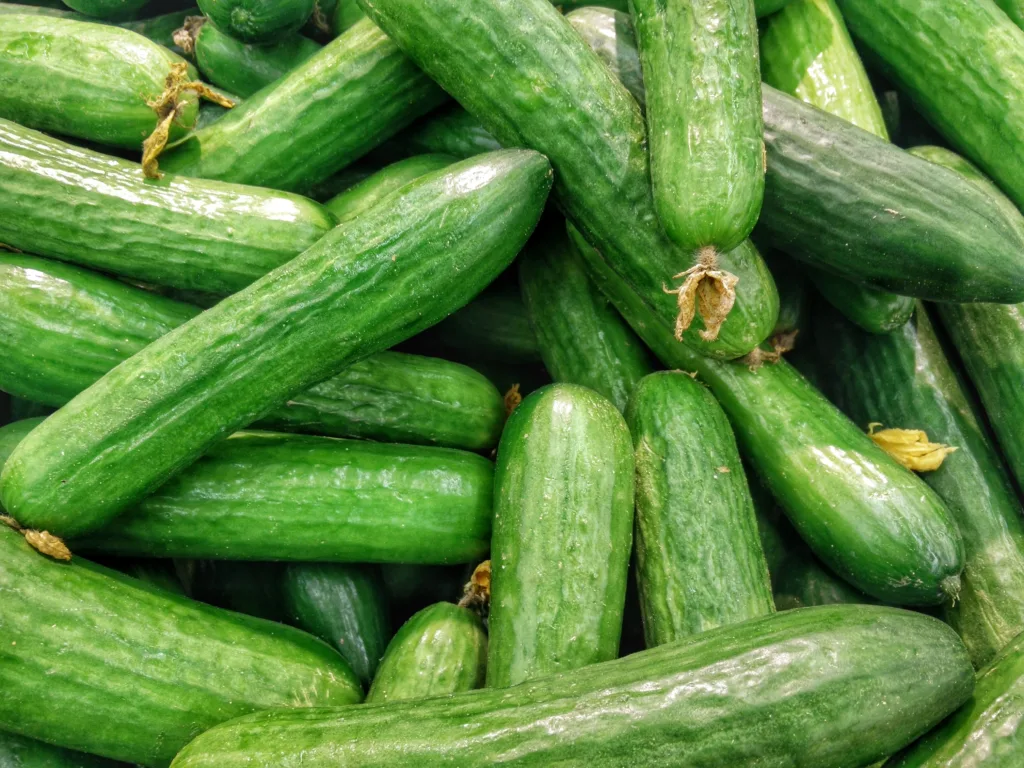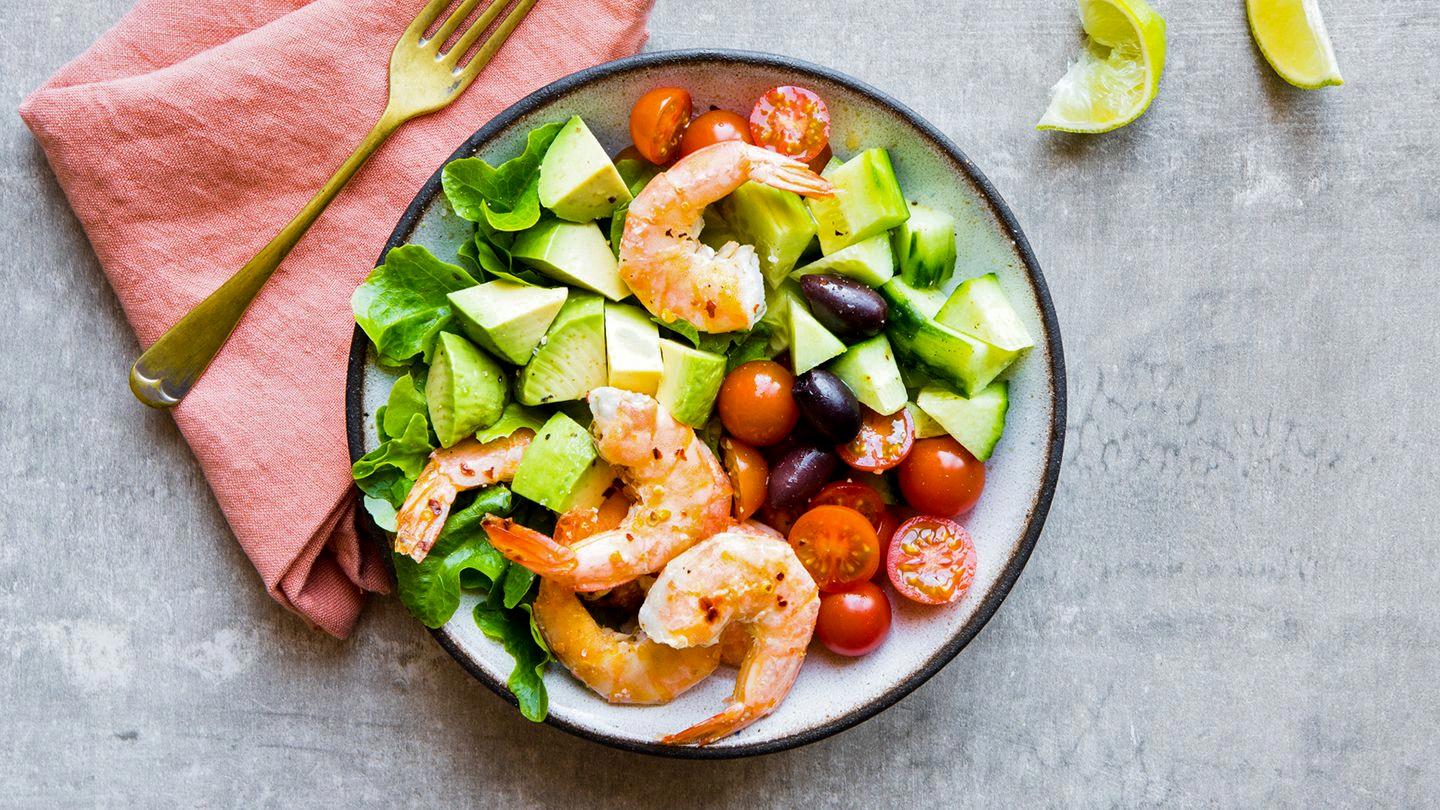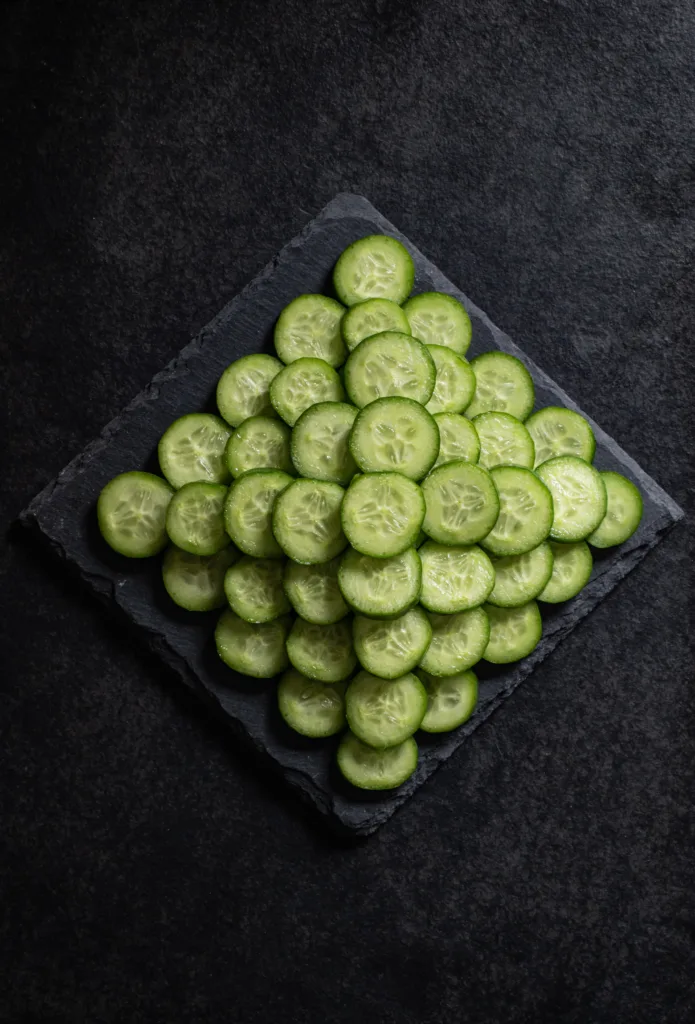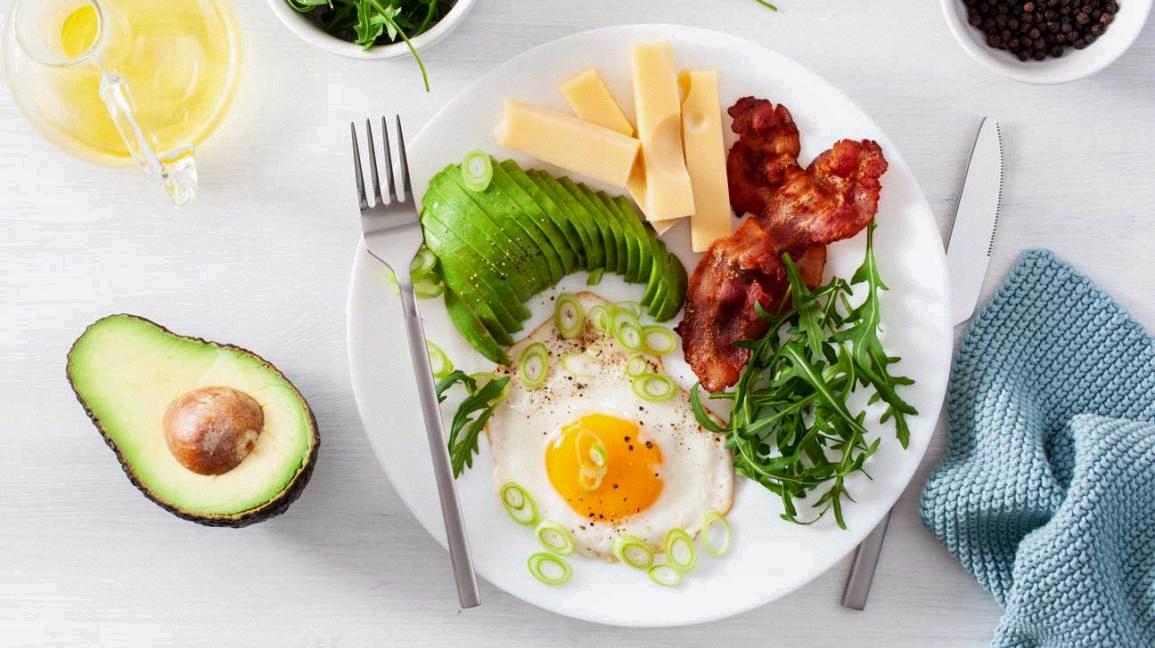Cucumbers are a popular and refreshing vegetable that are often used in salads, sandwiches, and even as a snack. Many people who are following a low-carb or ketogenic diet wonder if cucumbers have carbs and if they can be included in their meal plan. In this blog post, we will explore the carb content of cucumbers and whether or not they are a good choice for those who are watching their carb intake.
First, let’s take a look at the nutritional content of cucumbers. One cup (104 g) of chopped cucumber contains 4 g of carbs, less than 1 g of which is fiber. Although cucumbers aren’t very high in vitamins or minerals, they do contain a compound called cucurbitacin E, which may have health benefits.
It’s important to note that the carb content of cucumbers can vary depending on the size and preparation method. For example, one whole, raw cucumber contains 7.2 grams total carbs. However, with a litte bit of fiber, cucumber net carbs clock in at 6.2 grams for the same serving size.
So, can you eat cucumbers on a low-carb or ketogenic diet? The answer is yes! Cucumbers are considered a low-carb vegetable and can be included in moderation in a low-carb or ketogenic meal plan.
In fact, cucumbers can be a great addition to a low-carb or ketogenic diet for several reasons. First, they are low in calories, with only 16 calories per cup. This makes them a great option for those who are trying to lose weight or maintain a healthy weight.
In addition, cucumbers are high in water content, which means they can help keep you hydrated. They also contain a variety of antioxidants and anti-inflammatory compounds that may have health benefits.
When incorporating cucumbers into your low-carb or ketogenic meal plan, it’s important to keep portion sizes in mind. While cucumbers are low in carbs, eating too many can still add up and impact your daily carb intake.
Overall, cucumbers are a great low-carb vegetable that can be included in a healthy meal plan. They are low in calories, high in water content, and contain a variety of health-promoting compounds. So go ahead and enjoy some cucumbers in your next salad or as a refreshing snack!
The Benefits of Eating Cucumber on a Low Carb Diet
Yes, cucumbers are a great food to eat on a low carb diet. They are low in carbs, with only 4 grams of carbs per 1 cup serving of chopped cucumber, and less than 1 gram of fiber. This makes them an excellent choice for those follwing a low carb diet. In addition, cucumbers are very refreshing and can help to keep you hydrated. While cucumbers may not be high in vitamins or minerals, they do contain a compound called cucurbitacin E, which has been shown to have potential health benefits. So if you’re looking for a low carb snack or side dish, cucumbers are definitely a great option to consider.

Net Carb Content of a Whole Cucumber
For thoe of us watching our carbohydrate intake, cucumbers can be a great addition to our diet. In one whole, raw cucumber, you’ll find 7.2 grams of total carbs. However, it’s important to note that not all carbs are created equal. Some carbs, like fiber, aren’t fully absorbed by the body, meaning they don’t contribute to our overall carb count. With a little bit of fiber, cucumber net carbs clock in at 6.2 grams for the same serving size. This is because a whole cucumber contains around 1 gram of fiber. So, the net carb count is simply the total carb count minus the fiber count. It’s worth noting that cucumbers are also low in calories and contain beneficial vitamins and minerals, making them a great addition to any healthy diet.
Are Cucumbers Suitable for a Keto Diet?
Yes, cucumbers are an excellent addition to a keto diet. Cucumbers are low in carbohydrates and high in fiber, making them a perfect choice for those following a keto diet. One cup of sliced cucumber contains only 3.8 grams of carbohydrates and 0.5 grams of fiber, resulting in a net carb count of 3.3 grams. This low carb content is ideal for those following a keto diet, as it helps to keep the body in a state of ketosis, where it is using fat for energy instead of carbohydrates. Additionally, cucumbers are rich in nutrients such as vitamins C and K, and minerals like potassium and magnesium, which are essential for maintaining good health while on a keto diet. So, if you are lookng for a tasty and healthy low-carb snack or salad ingredient, cucumbers are certainly a great choice.
Lowest Carb Vegetables
The lowest carb vegetables are typically non-starchy vegetables such as leafy greens, cruciferous vegetables, and other low-carb vegetables. Examples of these low-carb vegetables include spinach, kale, lettuce, broccoli, cauliflower, cucumber, celery, asparagus, and zucchini. These vegetables are low in calories, high in fiber, and packed with essential vitamins and minerals. They are also great options for those following a low-carb or ketogenic diet, as they provide a variety of nutrients without adding too many carbs to the diet.
How Many Carbs Should I Consume Daily?
The amount of carbs you should eat in a day depends on varios factors such as age, gender, weight, and activity level. However, according to the Dietary Guidelines for Americans, carbohydrates should make up 45% to 65% of total daily calories. For instance, if you consume 2,000 calories a day, 900 to 1,300 calories should be from carbohydrates, which is equivalent to 225 to 325 grams of carbs per day. It is important to note that not all carbs are created equal, and it is recommended to consume complex carbs such as whole grains, fruits, and vegetables rather than simple carbs like sugary drinks and snacks. Additionally, it is advisable to consult with a healthcare professional or a registered dietitian to determine the optimal carb intake for your specific needs and health goals.

Source: everydayhealth.com
The Benefits of Eating a Cucumber Every Day for Weight Loss
Yes, eating a cucumber a day can help you lose weight. Cucumbers are low in calories and are rich in water content, making them an ideal food choice for promoting weight loss. The soluble fiber present in cucumbers helps to keep you full for longer periods of time, reducing the likelihood of overeating or snacking betwen meals. Additionally, cucumbers are packed with beneficial nutrients, such as vitamins C and K, and certain antioxidants that can help improve overall health and well-being. So, including a cucumber in your daily diet can be a healthy and effective way to support weight loss goals. However, it’s important to note that simply eating a cucumber a day won’t lead to significant weight loss on its own. A balanced diet and regular exercise are also key factors in achieving and maintaining a healthy weight.
Is Eating One Cucumber Per Day Excessive?
No, eating one cucumber a day is not too much. In fact, it can be beneficial for your health. Cucumbers are mostly made up of water, so consuming more than one cucumber will not cause any harm to your body. Moreover, eating one cucumber a day can keep you feeling full and help you avoid unhealthy snacking. Cucumbers are also low in calories and high in nutrients, such as vitamin C, vitamin K, and potassium. Therefore, incorporating one cucumber into your daily diet can be a healthy choice. However, if you have any specific medical conditions that require dietary restrictions, it is alwas best to consult with your healthcare provider.
Are Cucumbers High in Sugar Content?
No, cucumbers are not high in sugar. In fact, cucumbers are a low-sugar fruit, containing only 1.7g of sugar per 100g. This is due to their high water content and low levels of fructose, glucose, and sucrose. Cucumbers are also considered to be a low glycemic index food, meaning they won’t cause a rapid spike in blood sugar levels. So if you are looking for a low-sugar snack option, cucumbers are a great choice.
The Benefits of Eating Cucumbers
Cucumbers have numerous health benefits that make them a great addition to your diet. Firstly, cucumbers are a great source of hydration as they are made up of around 95% water. This can help you stay hydrated and maintain healthy skin. Additionally, cucumbers contain a high amount of fiber whih can help you stay regular and avoid constipation.
Cucumbers also contain a variety of vitamins and minerals that can boost your overall health. For instance, vitamin K found in cucumbers can help with blood clotting and maintaining strong bones. Vitamin A, on the other hand, can help with vision, the immune system, and reproduction.
Furthermore, cucumbers are low in calories and high in antioxidants, making them an ideal snack for weight loss and overall health. The antioxidants in cucumbers help to neutralize harmful free radicals in the body, which can help reduce the risk of chronic diseases such as cancer and heart disease.
Overall, cucumbers are a great addition to any diet due to their high water content, fiber, vitamins, and minerals. They can help keep you hydrated, regular, and provide numerous health benefits that can boost your overall well-being.

Are Peeled Cucumbers Suitable for a Keto Diet?
Yes, peeled cucumbers are considered keto-friendly as they have a low carb content of just 3.63 g per 100 g. Peeling the cucumber before consuming it can further decrease its carb content, making it an excellent snack or addition to keto-friendly meals. Cucumbers are also a great source of hydration, as they are primarily made up of water, and are rich in vitamins and minerals such as vitamin C and potassium. Therefore, incorporating peeled cucumbers into a keto diet can provide a healthy and low-carb snack option.
Can Peanut Butter Be Consumed on a Keto Diet?
Certainly! Peanut butter can absolutely be included in a ketogenic diet, but it’s important to make sure you choose the right kind. Look for natural peanut butter that doesn’t have any added sugars or hydrogenated oils, as those can add unnecessary carbs and unhealthy fats to your diet. Some brands even make peanut butter specifically marketed to low carb/keto dieters. It’s also important to watch your portion size, as peanut butter is calorie-dense and can add up quickly. If you’re looing for an alternative, almond butter is another great option that is slightly lower in carbs. Just make sure to read the label and choose one that is free of added sugars and oils.
Fruits to Avoid on a Keto Diet
If you’re following a ketogenic diet, it’s important to be mindful of the fruits you consume. While fruits are generally considered to be a healthy food choice, some are higher in carbohydrates than others, which can make them unsuitable for a keto diet. Here are some fruits that you should avoid on a keto diet:
1. Apples – Apples are high in carbs and sugar and should be avoided on a keto diet.
2. Grapes – Grapes are another fruit that is high in carbs and sugar, making them unsuitable for a keto diet.
3. Bananas – Bananas are one of the highest carb fruits and should be avoided on a keto diet.
4. Dates – Dates are high in carbs and sugar and should be avoided on a keto diet.
5. Mangoes – Mangoes are another fruit that is high in carbs and sugar, making them unsuitable for a keto diet.
6. Peaches – Peaches are a high carb fruit that should be avoided on a keto diet.
7. Pineapples – Pineapples are high in carbs and sugar and should be avoided on a keto diet.
8. Raisins – Raisins are another fruit that is high in carbs and sugar, making them unsuitable for a keto diet.
While thee fruits should be avoided on a keto diet, there are many other low-carb fruits that are perfectly suitable, such as berries, avocados, olives, and tomatoes. By choosing the right fruits, you can still enjoy the benefits of a keto diet while satisfying your cravings for something sweet.
How Many Carbs Should I Eat Per Day to Lose Weight?
If you’re loking to lose weight, the amount of carbs you should eat per day will depend on several factors, including your current weight, activity level, and overall health. However, a general guideline for weight loss is to consume fewer carbs than your body needs to maintain its current weight.
For most people, this means eating between 50 and 150 grams of carbs per day. If you’re physically active or want to maintain your weight, aiming for the higher end of this range may be beneficial. However, if you’re looking to lose weight quickly, going under 50 grams of carbs per day may help, but it’s important to do so under the guidance of a healthcare provider.
It’s important to note that not all carbs are created equal. Foods high in refined carbs, such as white bread and sugary drinks, can spike your blood sugar levels and lead to weight gain. Instead, focus on eating whole, nutrient-dense carbs like fruits, vegetables, and whole grains. These foods are also high in fiber, which can help keep you feeling full and satisfied, making it easier to stick to your weight loss goals.
Ultimately, the best approach is to experiment with different levels of carbs and see what works best for your body and weight loss goals. Be sure to consult with a healthcare professional before making any significant changes to your diet.

Source: healthline.com
Foods That Contain No Carbs
There are a few foods that have absolutely no carbs. These include meats like beef, chicken, pork, and lamb. Fish and seafood like salmon, tuna, shrimp, and crab are also carb-free. Most types of cheese are also free of carbs, including cheddar, mozzarella, and Swiss. Butter and oils like olive oil, coconut oil, and avocado oil have no carbs as well. Drinking water, black coffee, and plain tea are also carb-free options. It’s important to note that some foods may have very small amounts of carbs, but for the most part, the foods listed abve are considered to be carb-free.
Is Iceberg Lettuce Suitable for a Keto Diet?
Yes, iceberg lettuce is keto-friendly. It is an excellent option for those following a low-carb, high-fat diet like keto as it is low in carbohydrates, with only about 2 grams of net carbs per cup. Additionally, iceberg lettuce is a good source of fiber, wich is essential for maintaining a healthy digestive system. It is also low in calories, with only about 8 calories per cup, making it an excellent choice for those looking to lose weight on the keto diet. Furthermore, iceberg lettuce has a slightly higher sodium content than other lettuce varieties, making it a good source of electrolytes, which are essential for maintaining proper hydration levels while on a ketogenic diet. Overall, iceberg lettuce is a great addition to any keto meal plan.
Conclusion
In conclusion, cucumbers do contain carbohydrates, but they are considered a low-carb vegetable. One cup of chopped cucumber contains only 4 grams of carbs, less than 1 gram of which is fiber. Additionally, cucumbers are rich in a compound called cucurbitacin E, which may have health benefits. For those following a ketogenic or low-carb diet, cucumbers can be an excellent choice due to their low carb content. They are perfect for adding to salads or as a refreshing snack on a hot day. Overall, incorporating cucumbers into your diet can proide you with many nutritional benefits while still allowing you to maintain a low-carb lifestyle.
